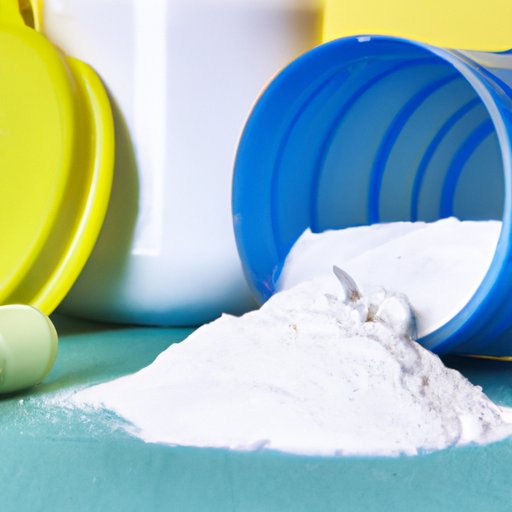
I. Introduction
Creatine, a naturally occurring amino acid, has become one of the most popular supplements for athletes, bodybuilders, and fitness enthusiasts. It is well-known for its ability to boost muscle size, strength, and endurance, and enhance athletic performance. However, like any supplement, creatine has its drawbacks, and some people may choose to stop taking it for various reasons. If you are wondering what happens if you stop taking creatine, this article is for you. Here, we will explore the pros and cons of ceasing creatine use, what effects you can expect, how to manage side effects, and whether a break from supplementation is advisable.
II. The Pros and Cons of Ceasing Creatine Use: A Comprehensive Guide
Before we delve into what happens when you stop taking creatine, let’s first review what creatine is and how it works in the body. Creatine is a naturally occurring substance found in muscle cells that provides energy for short, high-intensity activities such as weightlifting or sprinting. When you supplement with creatine, you increase the body’s energy stores, which can lead to improved athletic performance.
Some of the benefits of using creatine include increased muscle size and strength, improved endurance, better energy levels, and faster recovery times. Creatine supplementation has been shown to be safe and effective for most people, and numerous studies have confirmed its performance-enhancing effects.
However, there are also drawbacks to creatine supplementation. Some people may experience gastrointestinal issues such as diarrhea, bloating, or cramps, especially in high dosages. Creatine can also cause dehydration, as it draws water into the muscles to increase their size. Additionally, some research suggests that long-term creatine use may lead to kidney damage, although this is still a topic of debate and further research is needed.
In summary, the pros of using creatine include improved performance and muscle gain, while the cons include the risk of side effects and potential health risks.

III. The Effects of Stopping Creatine: What to Expect
So, what happens when you stop taking creatine? The short answer is that your body will return to its pre-supplementation state. However, the extent and timeline of this process can vary widely depending on many factors, such as your initial fitness level, training regime, and genetics. Below are some of the changes you can expect:
- Decreased muscle size and strength: Since creatine helps to increase muscle size and strength, stopping supplementation may lead to a decrease in those gains. However, this effect may not be significant for everyone, and some studies have found that muscle size returns to baseline levels within a few weeks of cessation.
- Loss of water weight: Creatine supplementation can cause significant water retention, which can lead to a bloated appearance. When you stop taking creatine, the excess water weight will be shed, which may lead to a temporary decrease in body weight and appearance of muscle size. However, this effect will not affect muscle function or strength.
- Decreased energy levels: Since creatine helps to provide energy for high-intensity activities, stopping supplementation may lead to decreased energy levels during workouts. However, this effect may not be significant for all, and other factors such as sleep and nutrition can also affect energy levels.
Keep in mind that the extent and duration of these effects can vary widely depending on many factors, such as the length of creatine use, the dosage, and individual responses. Some athletes and fitness enthusiasts report experiencing no negative effects after stopping creatine use, while others may experience significant losses or changes.
IV. The Truth About Creatine Withdrawal: How to Manage the Side Effects
Sometimes, stopping creatine use may lead to side effects that can be challenging to manage. Creatine withdrawal is a real phenomenon that can result in symptoms such as fatigue, cramps, decreased strength, and mood changes. If you experience any of these side effects, there are several steps you can take to alleviate them:
- Gradually decrease the dosage: If you have been taking creatine for a while, suddenly stopping can shock your body and lead to withdrawal symptoms. To avoid this, try gradually reducing your dosage over a week or two to give your body time to adapt.
- Stay hydrated: Since creatine can cause dehydration, it’s essential to drink plenty of water when supplementing with it. This advice also holds true when you stop taking creatine, as staying hydrated can help minimize side effects such as cramps and fatigue.
- Adjust your training regime: If you notice a significant decrease in energy or strength when you stop taking creatine, consider adjusting your training routine. Try decreasing intensity or volume or incorporating different exercises to challenge your body in new ways.
- Seek medical advice: If you experience severe side effects or symptoms that persist long after stopping creatine, such as kidney pain or discolored urine, seek medical attention.
V. Why You Might Want to Consider Taking a Break from Creatine Supplementation
While creatine supplementation is generally safe and effective, some people may choose to take a break from it for various reasons. Some of the arguments for taking a break include avoiding dependency on the supplement, giving the body a chance to reset, or exploring alternative training methods. On the other hand, some people argue that continuous creatine use is necessary to maintain gains and performance. While the evidence is inconclusive, here are some of the risks and benefits of taking a break from creatine:
- Potential benefits: Taking a break from creatine may help to reset the body’s energy systems and provide an opportunity to explore other training methods. It may also help to avoid becoming dependent on the supplement and encourage overall health and flexibility in sports routines.
- Potential risks: Stopping creatine use may lead to the loss of muscle size and strength and decreased athletic performance. Additionally, taking breaks too often or for too long may lead to undue stress on the body and interfere with long-term goals.
Whether you take a break from creatine or not depends on your personal goals and circumstances. Some athletes and bodybuilders incorporate regular breaks into their training routines, while others take creatine continuously for years without any adverse effects. It’s ultimately up to you to evaluate these risks and benefits and make an informed decision.
VI. Breaking Up with Creatine: Exploring the Impact of Stopping Use
If you do decide to stop taking creatine, you may be worried about losing the gains you’ve made. However, many athletes and bodybuilders have successfully maintained their muscle size and strength after stopping creatine use. The body has a remarkable ability to adapt to changes in supplementation, and muscle memory can help maintain strength gains even if you lose some muscle size.
One theoretical explanation for this phenomenon is that creatine supplementation triggers the body’s anabolic response, which leads to increased muscle protein synthesis and growth. Over time, this response becomes more efficient, meaning that the body can achieve similar gains with less creatine supplementation. When you stop taking creatine, the anabolic response continues to work, but at a reduced rate, which can help to maintain gains.
Of course, there is still a risk of losing some muscle size and strength if you stop taking creatine. Still, maintaining adequate nutrition, hydration, and training can help minimize those losses.
VII. What Happens to Your Body When You Stop Taking Creatine: Here’s What Science Says
Research on the effects of creatine cessation is still relatively limited, and the findings so far are mixed. Some studies suggest that muscle size and strength return to baseline levels within a few weeks of stopping creatine use, while others report a more significant loss of gains. Other studies have found no significant difference in muscle size and strength between those who continue to supplement with creatine and those who stop. However, these studies’ results may vary depending on the type of exercise used, the dosage of creatine, and individual responses.
While more research is needed, some experts suggest that maintaining adequate training and nutrition can help to minimize the effects of stopping creatine use. Additionally, incorporating alternative supplements or training methods may provide similar or complementary benefits to creatine supplementation.
VIII. From Muscle Loss to Fatigue: The Top Cons of Quitting Creatine and How to Deal With Them
As we have discussed, quitting creatine use may lead to several side effects and challenges. Some of the most common cons of creatine cessation include:
- Muscle loss: Without creatine supplementation, your muscles may lose some of the energy they need to perform high-intensity activities, which can lead to muscle loss and decreased strength. To mitigate this, try incorporating other energy sources, such as carbohydrates or caffeine, or adjust your training regime to include more endurance-based exercises.
- Fatigue: Creatine withdrawal can lead to feelings of fatigue and decreased energy levels during workouts. To combat this, try implementing a more conservative training regime that focuses on rest and recovery or increasing your intake of energy-boosting nutrients like iron or B-vitamins.
- Potential health risks: Some studies have suggested that long-term creatine use may lead to kidney damage or other health problems. However, more research is needed to confirm these findings. If you are concerned about the potential health risks of creatine supplementation, consider taking a break or exploring alternative supplements that may have similar benefits. Speak with a medical professional who can recommend the appropriate steps based on individual health considerations.




